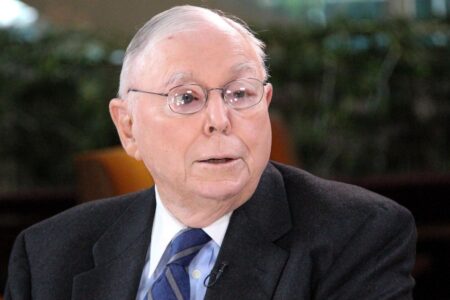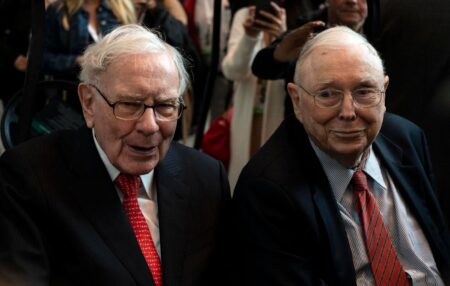Central bankers “talking tough” are raising the risk that the Federal Reserve’s tight-money policy will push the U.S. economy into recession, said Michael Arone, chief investment strategist at State Street Global Advisors, who suggested equity investors could ride out the tough times in consumer-discretionary, mega-cap technology and beaten-down energy stocks.
“It’s hard to tell where we are in the market cycle—everyone expects a recession in the next 12 to 24 months and analyst estimates are already forecasting a soft economic landing,” he said in an interview at the seventh annual Forbes/SHOOK Top Advisor Summit at the Encore At Wynn hotel in Las Vegas on Wednesday.
The benchmark S&P 500 index is up more than 11% this year, but it crested at 4,589 in July and has since slid to 4,259 as investors come around to the idea that the Fed will not quickly reverse its post-pandemic monetary-policy tightening.
Many market pundits awaiting the central bank’s next policy meeting in November expect rates to stay the same—but roughly 20% foresee another hike, according to the CME FedWatch Tool. “It’s almost inevitable that we have a recession if the Fed raises rates again,” Arone predicted.
After a prolonged period of low interest rates borrowers locked in debt at very low rates, which had a very positive impact on the economy, he said. But as those debts come due in an economy where the benchmark 10-year Treasury bond yield has exploded to 4.73% from about 0.5% in August of 2020, borrowers who need to roll over their obligations will find themselves in a much more difficult position. .“Investors will eventually need to refinance—but many of them think it doesn’t matter because the Fed will eventually cut interest rates anyway,” Arone said. “That’s too risky of a strategy.”
Rates are continuing to get pushed up, which warrants caution when looking at today’s market, he added. Despite some signs of a slowdown, he remains positive about healthy corporate profit margins, especially in the United States, where large companies are benefiting from new technologies. “That should sustain multiples a bit longer,” Arone said.
State Street is bullish on U.S. stocks but warned that a rising dollar–the currency is bolstered by the increased American interest rates–could pose a challenge to valuations for companies that sell their wares overseas. The firm is shunning most bonds meanwhile, but is keen on Treasury bills, which benefit from high short-term interest rates, and gold, an inflation hedge that the bank and investment-management firm likes as an “insurance policy.”
“This is the soft landing that everyone was talking about—we’re in it now,” he said, adding that corporate earnings are down for the third straight quarter.
The Fed is haunted by monetary-policy mistakes of the 1970s, he said, which is raising the risk of the central bank plunging the economy into recession as it tries to bring inflation back down to its long-term target of 2%. The core (excluding food and energy) personal consumption expenditures price index most recently falling to 3.9% in August from 5.47% in September 2022 is a promising sign, he said, but getting inflation the last few percentage points down to 2% will be the “hardest part.”
As the economy slows and the labor market’s strength dwindles, investors will eventually price in a recovery, Arone predicted, with beaten-down areas of the market—including small caps and value stocks—likely to lead the rebound.
Over the next few quarters, Arone said that his firm particularly likes consumer discretionary stocks, which should remain strong until there is an eventual round of layoffs that weakens the labor market. What’s more, the strength of the American consumer should continue to boost the economy, especially in terms of solid earnings and revenue, State Street’s chief investment strategist said.
The firm is also doubling down on the energy sector, with Arone pointing out that supply is still constrained while demand remains high as oil prices rebound. Energy companies are trading at historically modest multiples of about 10 times forward earnings, which suggests discounted opportunities in the sector, while many are also doing stock buybacks and posting dividends. The Energy Select Sector SPDR Fund is up just 1% this year, underperforming the rest of the market.
Arone says he thinks investing in giant tech stocks will make sense even in an economic downturn thanks to their stable finances and ability to capitalize on innovation. Seven large names have accounted for most of the S&P 500’s gain this year: Apple, Amazon, Microsoft, Meta Platforms, Google, Nvidia and Tesla.
Still, Arone expects that this dominance will eventually subside. “Market leadership has subtly changed already and will continue to do so, he predicted, “as monetary policy and other economic variables factor into the equation.”
Read the full article here













